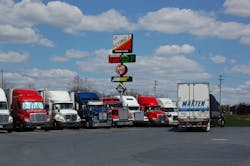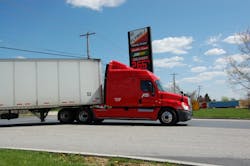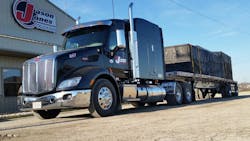The American Transportation Research Institute (ATRI) rates it as one of the trucking industry’s top five most pressing concerns; a lack of available truck parking.
Indeed, ATRI recently joined forces with the NATSO Foundation and NATSO, Inc., which represents the truck stop and travel center industry, as well as the American Trucking Associations (ATA) trade group to offer a free mobile application or “app” called “Park My Truck” that will become available this summer to help drivers to locate parking spots.
But is this truck-parking problem overblown to a degree?
I put this question to Ivan Tsybaev, founder and CEO of mobile app TruckerPath, the other day and he analyzed over 600,000 truck parking availability updates for April, all based on crowdsourcing data from the truckers using his company’s app.
Tsybaev’s results were, frankly, a little surprising:
- If you want to find parking, better to start looking before 10 pm, as after this TruckerPath only got 15% of updates saying that truck parking is available;
- Yet 12% of available truck parking spaces remain free even in the busiest time (11 pm to 4 am on working days), which not counting “partially empty” lots, which comprises 24% of the total during those “peak” parking hours;
- The truck parking situation always starts to improve after 7 am.
“We have data on more than 5,000 of truck stops/rest areas/fuel station with 210,000 truck parking spaces and you can actually see that not all the truck stops are busy,” he explained to me by phone.
“We actually found out that during busiest night hours we still get at least 9% of updates indicating parking lots are empty for every state. And this is not even counting ‘partially empty’ updates,” Tsybaev added. “And [the] percent of full parkings in the busiest time (11 pm to 4 am on working days) is not more than 70%.”So what’s going on here?
Well, to me at least, it seems TruckerPath’s data confirms what is perhaps the biggest driver of the truck parking issue: it’s not that parking isn’t available, it’s that finding available slots when you need one can be next to impossible.
“Lack of information about available truck parking across the nation is a serious problem, both for drivers and the inspectors who interact with them,” noted Collin Mooney, newly-installed executive director of the Commercial Vehicle Safety Alliance (CVSA) in a statement.
“We owe it to the hardworking drivers who spend countless hours on the road to do everything we can to help them find safe, convenient and accessible places to park and get the rest they need,” he said.
“Federal and state governments have spent decades and millions of dollars researching truck parking and testing technology-based approaches to counting available spaces, but not one of these efforts has yielded nationwide data about parking availability,” added Lisa Mullings, president of NATSO and the NATSO Foundation.
“We are still many millions of dollars and years away from implementing an electronic system that can count parking nationwide,” she pointed out. “The problem is that drivers need information now. We don’t want to allow our pursuit of a perfect solution to prevent us from implementing a good solution today.”
I talked to Joe Schmitz, a driver for Jason Jones Trucking, about this very issue – parking information – and he told me mobile apps are helping him solve his truck parking issues (when they come up) in a much more orderly fashion.
“I used to use a book called The Truckstop Guide, which was categorized by state and you'd look up whatever road you're on and find the exit to a truck stop or rest area along your route,” he explained to me via email.Now however he uses TruckerPath to find parking because it’s not only easier but far more accurate too.
“It is extremely simple as compared to the old way because it automatically pinpoints your location and shows you what parking is available near your location,” Schmitz said. “So now, instead of having to flip through pages of a book to find parking, I just open the app and it goes directly to my location and I just take a second to see what's near me. Before, it took about five minutes.”
As it pertains to trip planning or even needing a place for an unplanned or emergency stop, mobile apps are “just really convenient” in his words, “not taking much thought or time.”
TruckPath’s Tsybaev added something important to this debate over truck parking information: he developed an algorithm to prevent what he calls “the fraudulent uploading of data,” especially inaccurate parking availability data.
“So far the feedback we’re getting id that the data is 90% reliable in terms of parking availability,” Tsybaev explained to me. “We get updates several times a day, sometimes every 15 to 20 minutes, so we know it is ‘real-time.’ But after 10 pm it starts to fall off as everyone goes to bed.”
Yet it’s not all about the availability of overnight parking for truckers. Indeed, I participated in a conference call headed up by owner-operator Henry Albert a few weeks ago where a California driver noted that finding areas to just wait before delivering a load is becoming a tougher and tougher deal.
“I live in southern California and make daily runs into Los Angeles,” this driver told me. “I’m home every night, but my problem is finding a place to sit before I unload and load. That aspect [of the job] is getting very hard.”
Can technology help solve that particular parking issue? We’ll see.


